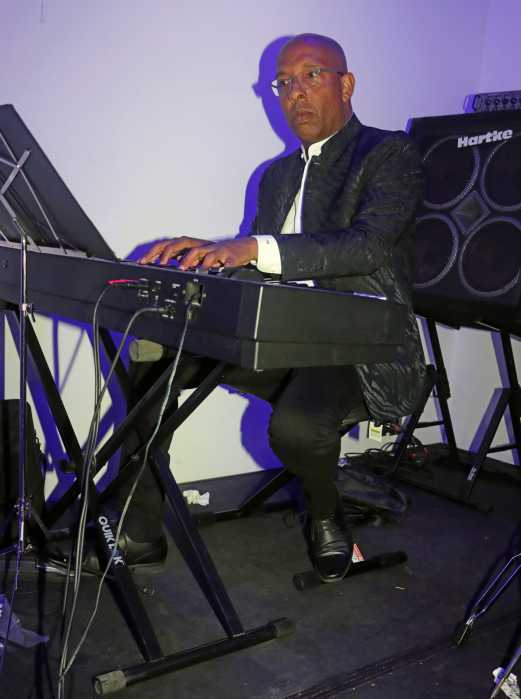Emeline Michel wooed the crowd with her velvety voice during the kick-off evening for the Haiti Film Fest that wrapped up May 12. Over 200 culture lovers packed the East Village venue Drom to watch three shorts from the Festival and bask in the melodic glow of the Haitian diva and support the work of Haiti Cultural Exchange (HCX).
Also, at this opening night gala, in a well-deserved recognition, award-winning journalist Michele Montas honored historian and political scientist Frantz Voltaire who is the director of the Montreal-based information and documentation center for Haitian/Caribbean and Afro Caribbean communities–CIDIHCA.
Born in Port-au-Prince, this documentarian, archivist, and filmmaker has a background of travel, study and teaching as part of his intellectually committed life. He was arrested and then expelled from Chile after the Coup d’état against socialist president Salvador Allende and later arrested and exiled from Haiti during the regime of dictator Jean-Claude Duvalier.
He eventually settled in Montreal and in 1983 launched the Center that has published 60 books and is the repository of documents, official records, photos, books, oral historical recordings, video productions and other artifacts that illustrate Haitians and their descendants (and Caribbeans and Afro-Canadians).
In his quest for documentation, Voltaire spent a month in Haiti in 2009-10 filming. The day before he was to leave, with extra time on his hands, he and his cameraman spent six hours with Haiti’s National Palace historian, filming the Palace. Serendipitously, the date was January 11, 2010, the day before Haiti’s devastating earthquake, which destroyed the Palace (now, completely razed). Voltaire left Haiti for Miami in the late afternoon of Jan. 12, on the last airplane to leave prior to the earthquake.
His last 30 years of collections and productions are the result of his passion for history. Voltaire produced the film “Port-au-Prince, Ma Ville” (2000) directed by Rigoberto Lopez that led the Fest schedule.
The two full days of screenings at St. Francis College attracted hundreds of attendees.
Q&As with the directors following the screenings offered ‘added value’ where the motivation, difficulties, symbolism and discussion of their filmmaking careers enhanced understanding of their films.
Six presenters traveled from afar to screen films, four from Haiti: director of Jacmel’s Cine Institute Paula Hyppolite and directors of short films, Kendy Verilus, Maksaens Denis and Romel Jean-Pierre.
Romel had just had a stint in New York during the Tribeca Film Festival where he appeared in a documentary with a short-featured role. He will be soon doing a six-week internship at HBO.
Traveling from Belgium, Jonas d’Adesky showed his beautiful film, Twa Timoun (Three Children) about three on-the-street boys in Port-au-Prince set within a post-earthquake cityscape. Two young girls also have prominent sensitive roles. This is perhaps the first narrative Haitian film where children are the main characters. Working with children was a challenge, D’Adesky admitted. The young director cast his characters from children he met while he was a volunteer in a group home after the earthquake.
Guetty Felin traveled from California to screen Broken Stones, her lyrical and articulate documentary of Haitians in a post-earthquake Port-au-Prince. This film celebrates Haitians speaking for themselves. The ravaged Notre Dame Cathedral, previously a jewel of pride and religious hub of the capital on the edge of downtown and working poor neighborhoods sets the scene. From inside or alongside the remnants and ruins of this magnificent structure, the speakers talk history, current reflections, hopes and dreams.
“It is a true pleasure to bring these filmmakers here, highlight their powerful work and showcase Haitian stories,” said HCX Director Regine Roumain, grateful for the Institutional support the Fest garnered.
The Haitian Embassy and the Haiti cultural institution FOKAL, who share HCX’s commitment to film and real cultural exchange, sponsored these filmmakers’ presence.
Sadly, scheduled to present his film, director of Anita, Rassoul Labuchin, who lives in Montreal and holds a Haitian passport, could not get a visa into the U.S. Anita is a Haitian classic, filmed in 1981. As a substitute, folk singer Ti Corn, who sings and appears as a goddess of the sea in the film, was able to speak to the audience by Skype.
[Ti Corn will also be making an appearance presenting her new CD, on May 24 at The Vault Café in Queens with poet and historian Jean-Claude Martineau and also at 7:00 – 9:00 p.m. (admission) on May 25 at Konbit restaurant in Brooklyn.]
HCX made a special effort at outreach this year and the Haiti Film Fest attracted many lovers of film who previously have not attended HCX’s other varied programs.
With such a diverse selection of films, there is also talk about the possibility of bringing the festival to Haiti, another example of cultural exchange.

Photo by Tequila Minsky


























